The potential of Public-Private Partnerships (PPP) to finance infrastructure projects was the focus of a webinar hosted by the Programme for Social Policy Evaluation and Research (PROSPER) at the College of Public Policy (CPP), Hamad Bin Khalifa University (HBKU).
The event was in collaboration with the School of Public Policy at the University of Maryland.
Using Public-Private Partnerships to Finance Major Infrastructure Projects: Lessons for the Mena Region shed light on realities, challenges, opportunities, successes and failures of different PPP models in the Mena region. Comparative perspectives highlighted the optimal tools that support PPP evaluation and decision making.
Dr Anis Ben Brik, associate professor at CPP and founding director of PROSPER, jointly chaired the discussions with Dr Douglas Besharov, director, Center for International Policy Exchanges, University of Maryland School of Public Policy, which featured experts from the public sector and academia from the Mena region, the US, and Europe.
Eminent speakers included Diana Furchtgott-Roth, Deputy Assistant Secretary for Research and Technology, US Department of Transportation; Dr Andreas Kopp, Member of the Regulatory Scrutiny Board, European Commission; Ziad Hayek, President of the World Association of PPP Units and Professionals and Vice-Chair of the Working Party on PPP of the UN Economic Commission for Europe; Dr Eyüp Vural Ayd?n, Chairman of Istanbul Public-Private Partnership Center of Excellence and Bart Oosterveld, Senior Fellow and the Director of the Global Business and Economics Program at the Atlantic Council.
Ensuring a broad range of policy-oriented discussions, the webinar’s expert panel also featured Dr Ehab Elsonbaty, Senior Legal Counsel, Head of Governance and Government Affairs, Qatar Investment Authority; Osama Suleiman, director, PPP Unit, Ministry of Finance, Jordan; and Samira Ben Sik Ali, director, Tunisian Public Private Partnership Agency.
Dr Ben Brik commented after the webinar: “In keeping with our intention for PROSPER to develop a policy-relevant research agenda driven by the grand social policy challenges facing Qatar and the Mena region, the webinar was an engaging and fruitful event. Our ongoing collaboration with Maryland University to host this webinar is one way in which we aim to bridge gaps between academia, policymakers, and practitioners with a vested interest in understanding the benefits and challenges of public-private partnerships.”
Dr Besharov, said: “When properly designed and implemented, public-private partnerships bring the expertise, efficiency, and financing of the private sector to the financing and construction of major infrastructure projects. We at the University of Maryland are honoured to partner with HBKU in this effort, which is focused on the needs of the Mena region.”
Qatar / Qatar
HBKU’s College of Public Policy co-hosts webinar on public-private partnership with Maryland university

Dr Anis Ben Brik
